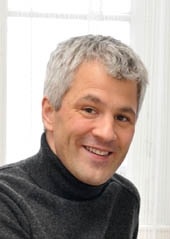Jan 4 2013
Enhancing energy efficiency in real estate is a global goal, one that Professor Timo Goeschl will discuss with local audiences here in Cincinnati when he delivers a talk on Germany’s pursuit of lower energy consumption.
 Professor Timo Goeschl
Professor Timo Goeschl
Goeschl, chair of Environmental Economics at the Alfred-Weber Institut for Economics at Heidelberg University in Germany, will be among leading specialists in economics, real estate finance and urban planning brought together by the University of Cincinnati to exchange ideas about energy efficiency and sustainability in real estate.
The University of Cincinnati Real Estate Center in the Carl H. Lindner College of Business is partnering with UC's Niehoff Urban Studio, part of UC's College of Design, Architecture, Art, and Planning, to present the Real Estate Energy Efficiency and Sustainability Symposium from 8 a.m.-5 p.m., Thursday, Jan. 10, 2013, at the Niehoff Urban Studio, 2728 Vine Street in Corryville. The Cincinnati Art Museum is also a sponsor of the event.
Goeschl’s keynote address, “The quest for residential energy efficiency: Evidence from Germany,” will discuss “policy measures put in place to foster private-sector investments in residential energy efficiency, summarizes current evidence on the impact, and provide several explanations for the emerging ‘implementation gap’ in Germany’s residential energy efficiency policies,” he says.
Along with Goeschl, other local, national and European thought leaders will join a panel of experts to address the benefits of going green in real estate.
- Nils Kok, assistant professor of finance and real state at Maastricht University, The Netherlands, is an environmental economics scholar. He’ll present research regarding the impact of energy efficient green offices on rental rates.
- Jennifer Owens, a San Diego-based manager of residential education programs with the U.S. Green Building Council (USGBC), will talk about LEED (Leadership in Energy and Environmental Design) policy changes. LEED is an internationally recognized certification system developed by USGBC. LEED-certified homes typically use 20 to 30 percent less energy.
- Michael Zaretsky, associate professor of architecture at UC’s DAAP, will discuss alternative certification programs, including one that he has written.
- UC Lindner College of Business doctoral candidate Avis Devine, ‘13 (finance-real estate), will present her dissertation research results on green policy incentives and whether or not these policies motivate more green construction.
The green symposium came about after the UC Real Estate Center assisted a local developer with case study research on a sustainable residential community. Professor Shaun Bond, director of the UC Real Estate Center, knew the topic would be of interest to the Greater Cincinnati real estate community.
Bond hopes that bringing policy makers, researchers and high-level real estate executives together in a forum will foster a greater understanding of “how real estate fits into energy efficiency measures, policies and designs,” he says.
Maastricht University's Kok will also participate in the UC Real Estate Center Roundtable on January 11, 2013, in a program titled: “The Economics of Energy Efficiency,” at Kenwood Country Club, 6501 Kenwood Road.